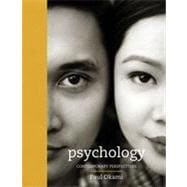Research-based but highly accessible, this fresh, contemporary, and engaging volume helps students appreciate the science of psychology and understand how its principles apply to their own lives.
~~~~~~~~~~~~~~
FEATURES
CONTEMPORARY PERSPECTIVES, NOT JUST CONTEMPORARY REFERENCES
Giving careful consideration to the field's historical foundations, Psychology: Contemporary Perspectives provides a unique balance of traditional and contemporary perspectives. This approach invites students to develop a modern appraisal of psychology.
THE MOST CURRENT RESEARCH
The book covers the latest in evolutionary psychology and behavior genetics, ecological and evolutionary theories of learning, cross-cultural work in cognition, the latest neuroscience data (and its critiques), and endophenotype research in the genetic causes of schizophrenia.
CLEAR AND COMPELLING WRITING
Exceptionally well written, Psychology: Contemporary Perspectives uses stories to help students connect with the principles of psychology.
RICH PEDAGOGY
All running features are integrated into the main body of the text, helping to maintain the flow of the narrative--and the attention of students!
* "Freeze Frame" snapshots underscoring the theme of each chapter tell the compelling stories of real-life individuals.
* "Living Psychology" applies psychology to students' everyday lives, helping them understand the benefits of what they are studying.
* "Critical Thinking about Psychology" sections give students the tools they need in order to effectively and objectively interpret research.
* "At the Forefront" highlights new and influential research in the field.
CAREFULLY CRAFTED STUDY TOOLS
Placing an emphasis on "review, retrieve, and learn," Psychology: Contemporary Perspectives takes a "back-to-basics" approach to study tools.
* "In Summary" sections provide clear, concise chapter descriptions, offering students powerful tools for review.
* "Retrieve!" questions encourage students to test their knowledge of what they have just read. Each question includes the page numbers on which the relevant material was first presented, aiding in additional review and reinforcing learning.
AN EXCELLENT VALUE
Oxford University Press USA, a department of the University of Oxford, is a not-for-profit publisher devoted to furthering the university's objective of excellence in research, scholarship, and education. Since accessible materials clearly support this mission, OUP USA uses a combination of not-for-profit status and financial discipline to offer course materials that generally cost students significantly less than those offered by commercial publishers.
SUPERIOR SUPPLEMENTS
We are proud to offer instructors and students a comprehensive set of ancillary resources.
* Instructor's Ancillary Resource Center: Available online exclusively to adopters, this valuable resource features detailed chapter outlines, lecture suggestions and activities, discussion questions, video resources, and Web resources, along with a computerized test bank containing 1,400+ test questions.
* Videos: Organized by chapter, these short contemporary video clips from YouTube are available for use as lecture starters and assignable class activities.
* PowerPoint-Based Slides: Each chapter's slide deck includes a succinct chapter outline and incorporates relevant chapter graphics.
* Course Cartridges: Available for a variety of learning management systems.
* Instructor's Companion Website: The instructor's portion of the companion website--available to adopters--includes all the teaching tools described above, which are available for immediate download (www.oup.com/us/okami).
* Online Homework: Oxford's Learning Management System delivers quality content and tools to track student progress in an intuitive, nationally hosted learning environment. Assessments are designed to accompany Psychology: Contemporary Perspectives and auto-graded so that instructors may check students' understanding without hours of grading. A color-coded gradebook shows instructors at a glance where their students are succeeding and where they need improvement; this allows instructors to adapt their lectures as needed at a moment's notice. For students, this means quality content and instant feedback. Oxford's Learning Management System features a streamlined interface that connects instructors and students with the functions that they perform most often, simplifying the learning experience in order to save instructors time and put students' progress first. (ISBN: 978-0-19-934982-1)
* Free Online Student Study Guide: Offering a variety of learning and review tools, this free online resource includes comprehensive yet concise chapter outlines, visual concept maps, and approximately twenty-five multiple-choice
questions per chapter.








